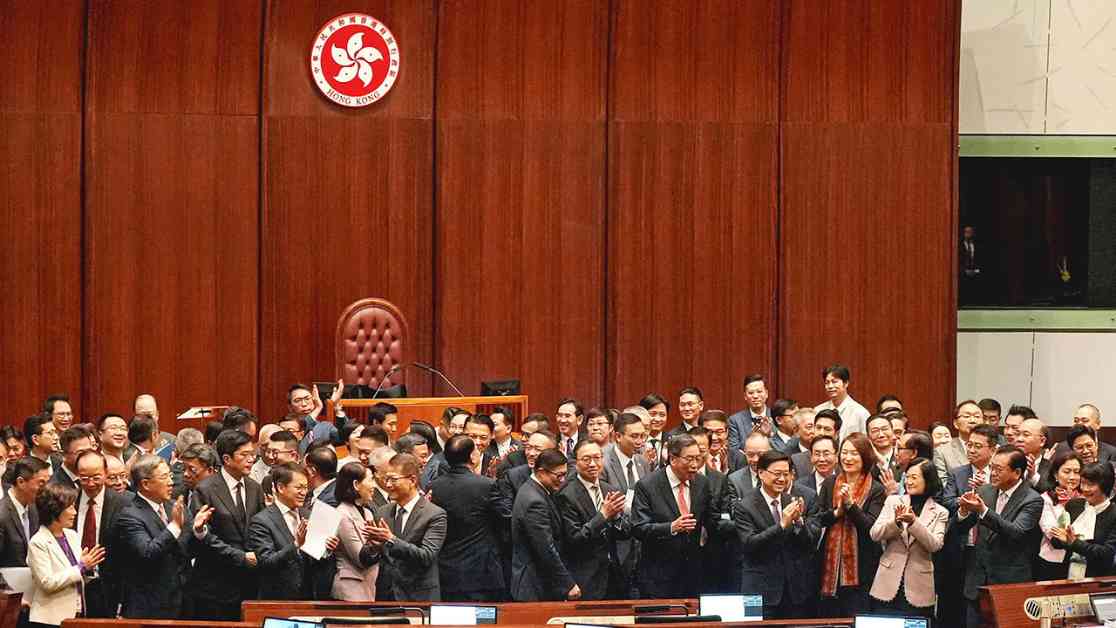As tensions continue to rise between Hong Kong and China, the recent passing of the national security law known as Article 23 has further solidified China’s control over the city. This controversial measure, which grants authorities more power to crack down on dissent, was unanimously approved by Hong Kong’s legislative council on March 19th. The swift passage of this bill, despite the opposition from many Hong Kongers, underscores the city’s diminishing autonomy and the tightening grip of Beijing.
Impact on Hong Kong’s Autonomy
The passage of Article 23 marks a significant blow to Hong Kong’s autonomy, which was promised under the “One Country, Two Systems” framework when the city was handed back to China from British rule in 1997. This framework was designed to guarantee Hong Kong a high degree of autonomy, including freedoms of speech, press, and assembly. However, the national security law erodes these freedoms and places greater control in the hands of Beijing.
The crackdown on dissent in Hong Kong has been escalating in recent years, with opposition politicians being disqualified, jailed, or forced to flee abroad. The requirement for Legco members to swear allegiance to the central government in Beijing further highlights the erosion of Hong Kong’s autonomy. The passing of Article 23 serves as a stark reminder of China’s increasing influence over the city and the diminishing space for dissent.
Global Reactions and Relations
The passing of the national security law in Hong Kong has sparked international concern and condemnation. The United States, in particular, has expressed strong opposition to the law, viewing it as a violation of Hong Kong’s autonomy and a threat to democratic values. The Biden administration has imposed sanctions on Chinese officials involved in the crackdown on dissent in Hong Kong, signaling a firm stance against China’s actions.
The European Union and other Western countries have also criticized China’s tightening control over Hong Kong, calling for the protection of human rights and democratic principles in the city. The global community’s response to the national security law reflects growing unease with China’s authoritarian practices and its impact on Hong Kong’s freedoms.
Subheadings:
The Erosion of Hong Kong’s Autonomy
Global Backlash and Concerns
China’s Assertive Approach and Global Relations
China’s Assertive Approach and Global Relations
China’s aggressive actions in Hong Kong are part of a broader strategy to assert its influence and power on the global stage. The national security law is just one example of China’s efforts to tighten control over territories it deems as integral to its sovereignty. Beijing’s assertive approach in Hong Kong is also reflected in its actions in the South China Sea, Taiwan, and other disputed regions.
China’s actions in Hong Kong have strained its relations with the international community, particularly Western countries that value democratic principles and human rights. The crackdown on dissent in Hong Kong has raised concerns about China’s intentions and its commitment to upholding international norms and agreements. The global backlash against China’s actions in Hong Kong has the potential to impact its relations with other countries and organizations.
China’s Increasing Influence and Power
The passing of the national security law in Hong Kong is a clear demonstration of China’s growing influence and power in the region. Beijing’s assertive actions in Hong Kong have sent a strong message to other territories and countries that challenge its authority. China’s increasing assertiveness on the global stage is a cause for concern for many countries, as it raises questions about China’s intentions and its adherence to international norms.
The national security law in Hong Kong is just one example of China’s efforts to consolidate its power and control over territories it deems as integral to its sovereignty. The crackdown on dissent in Hong Kong is a stark reminder of China’s authoritarian practices and its willingness to suppress voices that challenge its authority. The global community’s response to China’s actions in Hong Kong will shape the future of the region and China’s relations with the rest of the world.



























